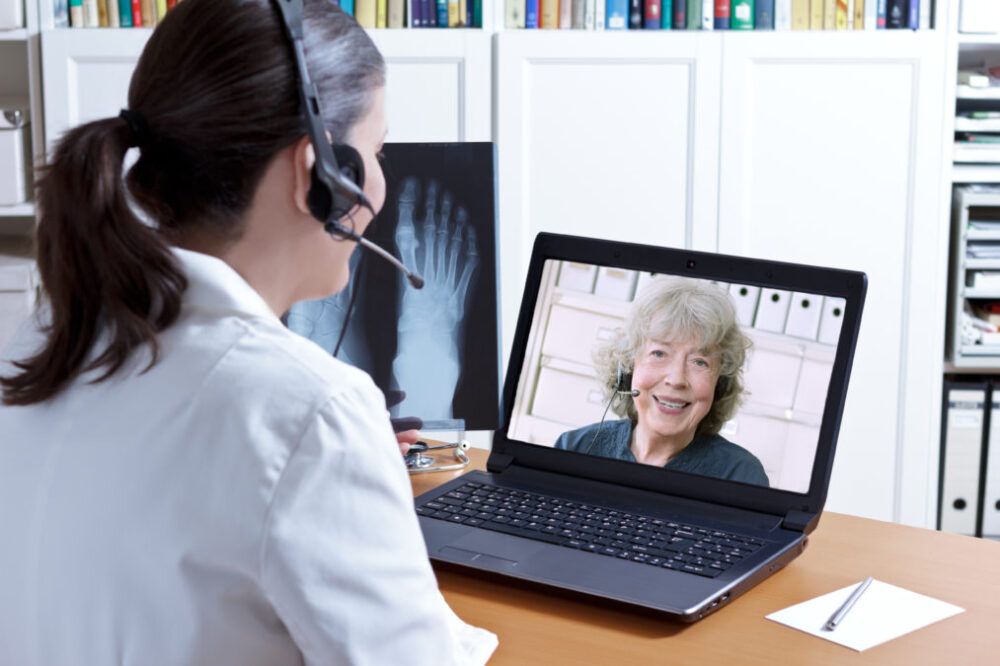Last Updated on May 4, 2024
What is the “New Normal”?
The administrators and staff of skilled nursing facilities across the United States are trying to ensure that their residents are not left behind during the Coronavirus pandemic. There is a concentrated consensus of facility executives in the nation that are comprehensively trying to keep everything as normal as they possibly can for their residents amid strict regulations set in place for their protection.
One of the keys to keeping as much peace as possible is placing a crucial focus on open communication with family members of residents to keep them updated during this medical crisis that has plagued the globe for the past several months. Families are not allowed to visit their loved ones in homes personally. This is why technology is being used a great deal as well as window visits. The windows have to be closed, so a lot of homes recommend using phones while being able to come as close to touching as physically possible without touching.
The first portion of 2020 has been difficult for our elderly population in homes. There are no group activities, no trips to the dining room, no hair appointments. Some homes are doing things like video bingo or offering one-on-one exercise classes to battle the overwhelming isolation that some residents are experiencing.
This pandemic has been difficult for everyone, but it’s particularly hard for the elders of our populations to understand. The ones that do have a comprehension are experiencing fear and anxiety. Even though many of them have dealt with circumstances that altered life as they know it such as the era of the Vietnam War, COVID-19 has a direct impact on all senior citizens’ lives, but particularly those who are living their day-to-day lives inside skilled nursing facilities.
For the safety of these valued members of our nation, visitors aren’t allowed inside skilled nursing facilities but most homes are making adjustments if their loved one is in hospice care. The nursing staff of these facilities across the nation has been wearing masks at the very least and extra clean crews are in place in many facilities.

The Diabetes Care Team
Your health care team will help you in the management of your diabetic condition and educate you on the maintenance of your health. The American Diabetes Association recommends that your diabetic care team include the following individuals:
You are the nucleus of your care team. No one can tell your doctors how you’re feeling better than you can. Your team is depending on you to communicate with transparency and supply them with the information that is needed regarding your body.
You must be sure to monitor your blood sugar so that you can tell your team if you are having swings so that they can adjust your treatment if needed. Maintaining blood sugar levels reduces hypoglycemia episodes.
Your primary care doctor is who you see for general checkups and when you get sick with viruses or the flu. This medical professional usually is an internal or family medicine doctor who treats people with other conditions such as diabetes as well. Your primary is considered the main source of your care so he or she will usually be the head of the diabetic care team.
You will have an endocrinologist on your team. These doctors have specialty training in treating diabetic patients. You should be seeing your endocrinologist regularly.
A registered dietitian who is trained in nutrition should also be on your team. Food is very key in the control of diabetes. Your dietician will help you plan meals that are based on how much you weigh, how sedentary your lifestyle is, what medication you take, and established goals such as bringing down cholesterol levels and blood pressure.
The nurse educator is a diabetes educator or nurse practitioner who has gained special training and background in the area of administering care and education to people who are living with diabetes.
You should have an eye doctor (either an ophthalmologist or an optometrist). As a diabetic, you must have an eye check done annually at the very least. Diabetes can affect the blood vessels in your eyes and it can lead to complete sight loss.
Every diabetic should have a podiatrist. Diabetes can cause nerve damage in the extremities; therefore foot care is of utmost importance. Podiatrists are trained in treatments for issues that plague the feet and lower legs.
People who are diabetic have a greater and earlier risk for gum disease so they should have a dentist on their team. The blood sugar that excessively pools in your veins also is in your mouth and it creates a home for infection. Dental checkups should be maintained on a bi-annual basis. Be sure your dentist knows that you are a diabetic.
Exercise trainers are optional for the diabetic team, but should not be. No matter what type of diabetes you have exercise can and should play a role in the management of this disease.
Getting Accustomed to Telehealth
 Ask many questions. You are entitled to know how your visit will occur. The doctor will be able to see your entire foot by telling the nurse to pan from left to right or up and down. If debridement is needed, the doctor can guide the nurse that is doing rounds on how to do it. Even though your clinician is not physically there, he or she is with you and the nurse through the entire visit.
Ask many questions. You are entitled to know how your visit will occur. The doctor will be able to see your entire foot by telling the nurse to pan from left to right or up and down. If debridement is needed, the doctor can guide the nurse that is doing rounds on how to do it. Even though your clinician is not physically there, he or she is with you and the nurse through the entire visit.
Continuum of Care is Life-saving
The importance placed on the continuum of care can be respected during this pandemic through telehealth. This is the best way for your diabetic care team to still take care of you through this time of crisis in our nation.
Additionally, you should not succumb to feelings of depression or oppression that can come with times of isolation. Your emotions can affect your health. Everyone needs their immune systems to be optimal during this time and you can boost your immune system by talking out your feelings. You could ask a loved one or a caregiver for paper and pen or a way for you to record your voice. These tools can be used as a journal.
If you have ideas for fun activities for yourself and your friends that still respect the social distance limitations, tell one of your nurses.
You could also request digital tools such as a smartphone or Facebook portal from your family so that you can see them while you are talking to them.
Another option is to ask if you can have a window picnic with your family. Some facilities will not allow outdoor food to come in, but it’s worth asking if it is allowed where you are. Your family could sit outside of your window and have a phone set on speaker so that you can be handsfree while you have a picnic together.
Mental and emotional stability is as important as medical stability. Feed yourself good feelings the same way you eat good food.
Lastly, it is important to reiterate that you should not be afraid to ask questions. It’s okay to say you are afraid and it’s okay to ask anything you need to ask to calm your mind and your spirit. Be well.
